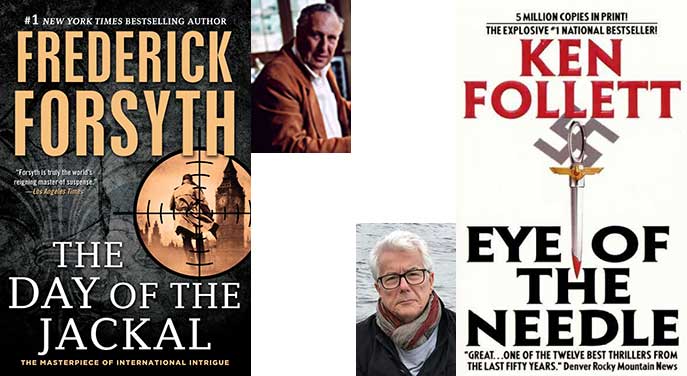 This summer marks the 50th anniversary of Frederick Forsyth’s The Day of the Jackal. It’d be hard to conceive of a more spectacular novelistic debut.
This summer marks the 50th anniversary of Frederick Forsyth’s The Day of the Jackal. It’d be hard to conceive of a more spectacular novelistic debut.
Forsyth was a “flat broke,” unemployed English journalist in his early 30s. Hopefully, a novel would help clear his debts.
While the book’s inspiration was the failed 1962 assassination attempt on then-French president Charles de Gaulle, Forsyth didn’t base his story on the details of the actual event. Instead, his imagination took over.
He conjured up an alternative scenario, wondering what might have happened if a professional assassin had been hired for the job. And Forsyth approached his research with the thoroughness of the investigative reporter he’d once been, validating the plot’s plausibility by appropriating the identity of a dead child in order to (illegally) procure a false passport.
Initially, there was trouble finding a publisher. But when it came together, things happened quickly. The Day of the Jackal was a huge hit on both sides of the Atlantic, and Forsyth was launched on a career that’s encompassed decades of best sellers. Suffice to say that he’s “flat broke” no more.
Another Brit, Welshman Ken Follett, entered the arena later in the decade. For him, the breakthrough novel was 1978’s Eye of the Needle. And like Forsyth, it set a popularity pattern that’s persisted for decades. In fact, he’s still at it.
Follett also had a journalism background, although he’d gotten bored with it and had migrated to working for a publisher. In his telling, he started writing fiction as a hobby and then resolved to earn enough from it to cover car repair costs.
Follett has also supplemented his standalone novels with a couple of series.
The Kingsbridge books began with a story about building a cathedral in 12th century England, proceeded with two more taking the timeframe up to the Elizabethan era, and then circled back for a Dark Ages prequel.
And there’s the Century trilogy, following the lives of five interrelated families through the trials, tribulations and turmoil of the 20th century. It’s an absorbing read, designed to hook you and eagerly seek out the next instalment.
Screens, big and small, have played a significant role in propagating the works of both men.
Forsyth’s The Day of the Jackal was promptly snapped up for filming and turned into a hit 1973 movie – even inspiring a 1997 remake. There were also film adaptations of subsequent books, including The Odessa File and Dogs of War.
Follett, too, saw his breakthrough novel turned into a theatrical movie. Released in 1981, Eye of the Needle starred Donald Sutherland and scored well at the box office and with critics.
TV, however, has been the primary screen outlet for Follett’s work. The Key to Rebecca, published in 1980, was the first of several novels adapted for multi-episode TV presentations. And more recently, two books from the Kingsbridge series have received the full eight-part treatment.
Mass popularity authors often struggle for critical respect, but that’s not necessarily the case with Forsyth and Follett. From time to time – and especially in their early days – there’ve been glowing notices.
The Day of the Jackal, for instance, was considerably boosted by two laudatory pieces in The New York Times coincident with its North American publication. And it won the 1972 Best Novel award from the Mystery Writers of America. Similarly, Eye of the Needle was lavishly praised and won the 1979 award.
Forsyth’s prose has elicited varying descriptions ranging from “graceless” to “crisp, factual, and clear paragraphs that efficiently convey information.” His huge strength is in his plotting. With his detailed research and vivid imagination, he can spin a story that pulls you in.
The perfect example is the way he builds suspense in The Day of the Jackal. Because de Gaulle was never assassinated, the reader knows the denouement in advance. But that doesn’t in any way detract from the pleasure of the journey.
Follett’s style is perhaps more felicitous and his characters might be a shade more nuanced. But he, too, can craft a gripping plot.
If you’re partial to thrillers but aren’t familiar with either man, find a copy of The Day of the Jackal or Eye of the Needle and enjoy a riveting read. Better still, read both of them.
There’s a lot to be said for talented storytellers.
Troy Media columnist Pat Murphy casts a history buff’s eye at the goings-on in our world. Never cynical – well, perhaps a little bit. For interview requests, click here.
The views, opinions and positions expressed by columnists and contributors are the authors’ alone. They do not inherently or expressly reflect the views, opinions and/or positions of our publication.
© Troy Media
Troy Media is an editorial content provider to media outlets and its own hosted community news outlets across Canada.



